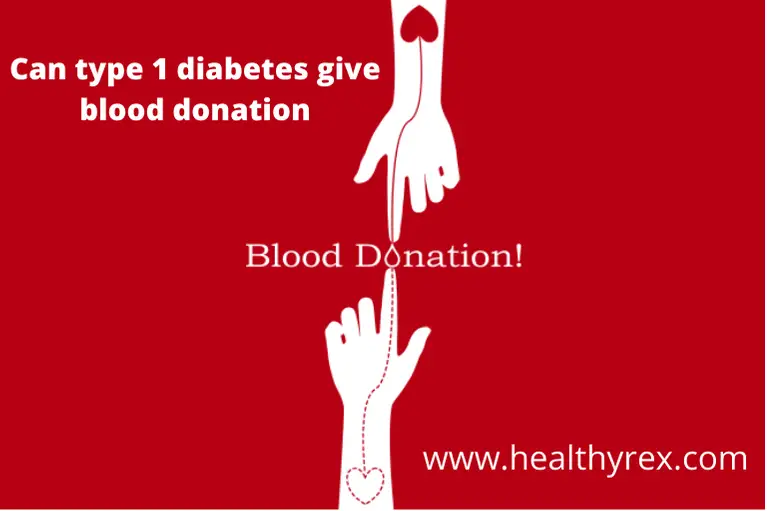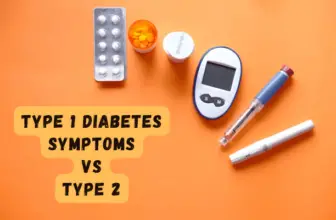Can Type 1 Diabetes Give Blood Donation?

Blood donation is the best helpness way to help others. Many people need a blood transfusion for many different medical conditions, and your donation helps save a precious life. But in many minds, the question can type 1 diabetes donate blood?
According to the American Red Cross, someone needs blood every two seconds. A pint of blood donation is helpful for three people. Besides, not all diabetic patients can donate blood. Furthermore, there are some blood donation requirements you have to meet in case you are a diabetic patient.
Is it safe to donate blood if have diabetes?
It is generally safe for diabetic patients to donate blood, and you can do it without any harm. If you have type 1 or type 2 diabetes, you can donate blood. But there are some conditions that you have to fulfill. Firstly, your condition should be under control, and you are in good health before donating your blood.
Under control, diabetes means that you have a healthy or average blood glucose level. For this, you have to be careful and watchful about your blood sugar level daily. You have to be more aware of your blood sugar levels, and besides, you need to be thoughtful about your proper diet and regular exercise.
A healthy lifestyle always contributes to healthy blood sugar levels. To keep your blood sugar level in a healthy range, your doctor may prescribe some helpful medications. Furthermore, these medications shouldn’t impact the ability of your blood donation.
If you are still concern about your diabetes before donation, then talk to your doctor. He will answer your questions and can examine your health conditions.
During blood donation, if you have diabetes:
Health screening

To disclose any pre-existing conditions, blood donation centers have a health screening process. In this health screening process, a certified Red Cross professional will attend you and measure some of your vital statistics like blood pressure, temperature, and pulse. To check your hemoglobin levels, they will take a small sample of blood.
You have to share your conditions about diabetes at the screenings if you have diabetes. Besides, the person at screening may ask you some additional questions. For this, make sure you have all the essential information about the medication you are using for your diabetes. But these diabetes medications didn’t stop you from blood donation.
The person who wants to donate blood, whether he has diabetes or not, must meet the following requirements.
- Weight at least 110 pounds
- Have usually good health and especially on the day of donation.
- He or she would be 16 years or older. But the age requirement varies in different states.
In case you are not feeling well on the day of your blood donation, you should reschedule your session. There are some other factors and health conditions that prevent you from blood donating like international travel. Check your blood donation center to have all the information that may prevent you from donating.
Blood donation process
The entire blood donation process would take about an hour from your precious time. However, the time for blood donation takes about 10 minutes in total. While donating blood, you will be seated in a comfortable place.
At first, the person assisting you in donations before inserting a needle will sanitize your arm. Generally, there is no pain; the needle will cause a slight pain feeling like a pinch. And once the needle is in, there will be no pain.
How can I prepare myself for donations?
Before blood donation, there are a few things you have to be careful about.
-
Hydrate your body

In case you have diabetes, then before donating blood, take non-carbohydrate fluids, mostly water. In this way, you will make sure that you are properly hydrated and have adequate nutrients. Try to drink a lot of water, especially a few days before your blood donation schedule.
-
Eat iron-rich foods
Eat iron supplements or iron enriches food one or two weeks before your blood donation. Iron-rich food and its supplements will help you to raise your blood glucose level. Therefore, eating kale, spinach, cereals, raisins, lean red meat, beans, and other foods helps blood production.
If you want to take vitamins with iron, then talk with your doctor to complete a prescription. Start taking iron supplements before blood donation.
-
Proper sleep
Before blood donation, take proper sleep of eight hours. Adequate sleep helps avoid post-blood donor fatigue. Thus sufficient sleep is essential. Then try to get eight or more hours of adequate sleep.
-
Eat a healthy diet
If you have diabetes, try to eat proper meals to keep your A1C target with your healthy eating habits. Especially in the case of diabetes, regular meals play an essential role in its maintenance.
Use a proper diet plan leading up to your donation and even afterward, especially when you have diabetes. To have control over your condition, the best way is to maintain your blood sugar level.
-
Avoid Caffeine

Try to avoid caffeine, even a little amount of it, before blood donation, and use water as much as you can. Besides, avoid alcohol and drink 16 ounces of water to keep your body hydrated. On your donation date, don’t use caffeine.
-
List of medications you use
Before heading to the blood bank, make sure you bring a complete list of your medications and supplements. The plan must include the medicines you are using for your diabetes or any other condition, such as heart diseases or blood pressure.
If you have used bovine insulin in the past you cannot donate your blood due to the “Mad Cow” disease risk. It is not a case in the US but probably common in the UK. Before blood donation, you must have your identification with you.
Thus make sure to carry your picture identification, driving license, and other identification with you.
-
Avoid high fat-containing food

It is vital to avoid high fat-containing food if you have diabetes, but it is especially crucial for blood donation. When Red Cross tests your blood to determine your blood donation eligibility, fatty food affects your results.
If an excessive amount of fat is present in your blood, then Red Cross will be unable to test your blood for infectious processes, affecting the recipient. Thus this blood cannot be used for transfusions. Make sure to avoid fatty food such as fried foods, ice creams, and high-fat meats before blood donation.
-
Reschedule your donation
In case you are not feeling well before your blood donations, then reschedule it. You must be feeling healthy before blood donation. You must postpone your blood donation date until you are feeling healthier and vital again.
Blood donation can be tiresome as many feel tired and weak after it.
This Miracle Supplement Will Treat The Root Cause Of Diabetes in Just Days! Buy Sugar Balance Supplement For as Low as $33/Bottle. Lowest Price Online. Huge Savings. Improve Your Metabolism and Regulate Healthy Sugar Levels. All Natural. No Side Effects. 180 Days Money-Back Guarantee.
What can I expect after donating blood?
After blood donation, keep track of your blood sugar level and continue to take a proper and healthy diet. Significantly add iron supplements and iron-rich food in your nutritious diet for at least 24 weeks after your donation.
Generally, you must
- Take proper rest if you feel dizziness.
- If your arms feel sore, use acetaminophen.
- In case of avoiding bruising, keep your bandage for 4 hours.
- Increase your fluid intake, especially for a few days following your donation.
- Avoid tough and tiring activities for at least 24 hours after donation and avoid exercise as well.
- If you are sick or have other symptoms after blood donation, contact your doctor immediately.
Can type 1 diabetes give blood?
There is someone at every second whose life can be safe from your donation. We all know that blood donation is a worthy thing to serve society. But the blood donation is accepted as a healthy and cooperative body that agrees with the blood through your veins.
So the question can type 1 diabetes donate blood? Many of us think that they can’t. Wrong! Blood donation depends on the conditions of the donor, such as:
- The type of insulin you are using
- Your blood glucose levels
- Where you live
- Think about your safety
You would not be at greater risk of faintness or nauseous after donation due to your type 1 diabetes. There are some cases where donors report a slightly higher blood glucose level for 3 to 5 days after donation.
Your blood glucose level will not have a drastic change, and neither it spikes nor bottom out suddenly. But doctors say that accelerated red blood cell turnover due to blood loss may lower you A1C or HbA1c.
After blood donation, it is essential to nourish your body by maintaining the blood glucose level. For a few days, more fluid and iron intake help a lot. Be smart and take more care of yourself as generally, you do.
Blood Donor Requirements
Blood donor requirements vary with countries. Before donating the blood, the donor has to fulfill them.

US blood donor requirement
- On the day of donation, be in overall good health.
- Must weight 110 pounds or even more for donation.
- Must be at least 17 years old, for 16 years old donor parental consent is essential.
- When you arrive at the donation center, a professional will take you to the screening test. You will require giving all of your health information, including diabetes. You should have all the information about your diabetes and the medications you are taking.
- Your A1C will not be tested before giving blood, so your honesty regarding your health conditions is vital. As long as you have an average level of blood glucose level, you can easily donate blood.
- If you pass the general health tests and your blood glucose level is stable, then your insulin source is the only remaining factor. In past days a person who uses bovine-derived insulin was not allowed to blood donations due to the risk of mad cow disease (vCJD).
In April 2020, the FDA has removed its restriction in its updated guidance.
After blood donation
- Continue to hydrate yourself
- Take proper rest in case of dizziness
- Avoid all strenuous works and exercise
- If iron supplements suits, you continue to take them.
UK blood donor requirement
If you wish to donate blood and have type 1, then the blood bank representative will ask you some questions. They generally ask the kind of insulin you are taking, the way you take it, your average level of diabetes, and some others.
In the UK, the governing health organization responsible for blood and transplant refuses to take blood from the people at greater health risk by giving donations. Unfortunately, they prevent the diabetes patient from taking any form of insulin, whether through pump therapy or injection.
This rule not only disqualify Type 1 diabetes patient but type 2 diabetes patients as well. In most cases, people in the UK are not allowed to donate their blood if they have any diabetes.
Furthermore, if you have heart disease in maximum cases, you cannot donate blood. The things that prevent you from donations include heart failure, faintness, blocked and narrow arteries, and surgeries.
Some other medical conditions prevent you from donating includes nerve damage, foot ulcers, neuropathies, dental problems, transplants of pancreatic tissues, and some others.
Australia blood donor requirement
Like in the US states, diabetes patients are allowed to donate their blood as long as they are healthy via Red Cross. But their blood vessels, kidney problems, eyes, and their blood glucose level must be under control. But you may not be eligible if you have ever used bovine-derived insulin.
Canada blood donor requirement
In Canada, people with type 1 diabetes are not allowed to donate their blood. Besides, people with diabetes who are working to maintain their blood sugar levels are eligible to donate.
What if you turned down to donate blood due to diabetes?
If you are willing to help others and cannot donate blood due to diabetes, you can still help in many ways. You can even donate money to the Red Cross. Your donation will help Red Cross provide supplies for blood donation banks in supporting the families who are in need and want help, especially in educating people with basic life-saving and emergency techniques. Red Cross is doing many things to help others; you can help them fulfill their mission.
End words by the writer
Blood donation is a selfless effort that directly helps people struggling with their health. If you have well-controlled diabetes, then it would not prevent you from blood donation.
If you are healthy, whether diabetic or not, you can donate once every 56 days. But if after donation, you are experiencing unusual symptoms, then first consult your doctor.
FAQs
How long it takes in blood donation?
The whole blood donation process generally takes about an hour at a blood bank in donating a pint of blood. It is just a small part of your precious time to help three people in need.
The whole process takes about one hour, but the actual blood donation will not take more than 10 minutes. A gauge needle is inserted into your vein, which feels like a little pinch. During blood donation, you can sit comfortably on a chair.
How can I prepare for Blood donation?
Preparation before blood donation is essential for safety and health purposes.
- Drink more water
- Take a healthy diet
- Consume iron supplements
- Take proper rest
- Avoid caffeine before blood donation
Can I donate blood with type 1 diabetes?
Yes, you can donate blood with type 1 diabetes. But the condition is you have excellent overall health, and your blood glucose level must be in proper control. Good general health means you can perform your daily activities without any problem.
Related Reading:






